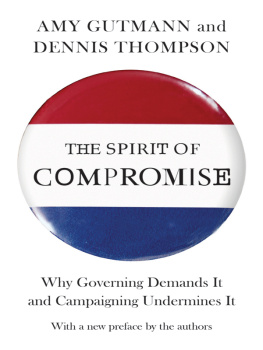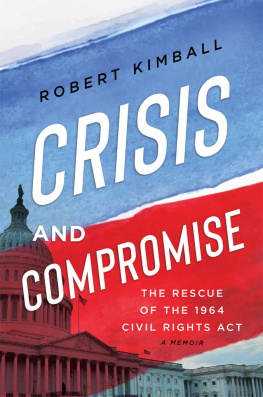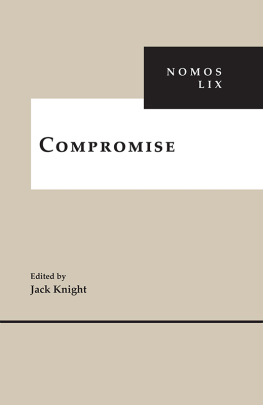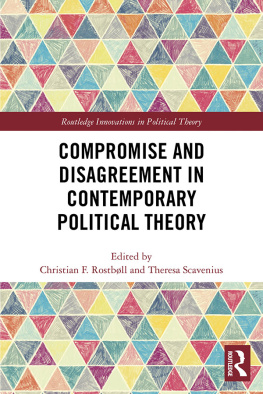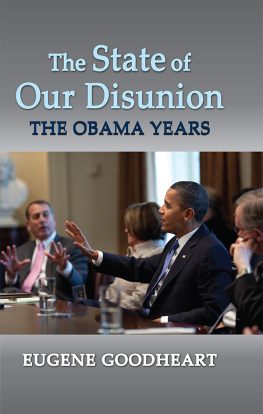Copyright 2012 by Princeton University Press
Published by Princeton University Press,
41 William Street, Princeton, New Jersey 08540
In the United Kingdom: Princeton University Press,
6 Oxford Street, Woodstock, Oxfordshire OX20 1TW
press.princeton.edu
All Rights Reserved
Fifth printing and first paperback printing, with a new
preface by the authors, 2014
Paperback ISBN 978-0-691-16085-6
The Library of Congress has cataloged the cloth edition of
this book as follows
Gutmann, Amy.
The spirit of compromise : why governing demands it
and campaigning undermines it / Amy Gutmann and
Dennis Thompson.
p. cm.
Includes bibliographical references and index.
ISBN 978-0-691-15391-9 (hardcover : alk. paper)
1. Political planningUnited States. 2. Decision making
United States. 3. Compromise (Ethics) United States.
4. Consensus (Social sciences) United States.
5. DemocracyUnited States. I. Thompson, Dennis F.
(Dennis Frank), 1940 II. Title.
JK468.P64G87 2012
320.60973dc23
2011053123
British Library Cataloging-in-Publication Data is available
This book has been composed in Melior
Printed on acid-free paper.
Printed in the United States of America
5 7 9 10 8 6
PREFACE TO THE PAPERBACK EDITION
When our book first appeared in the spring of 2012, the spirit of compromise was in short supply, most conspicuously in the U.S. Congress. It still is.
Gridlock shut down the government in the fall of 2013, and took the nation to the brink of defaulting on its debt for the first time in its modern history. Each party accused the other of refusing to compromise, but what both were calling for was closer to capitulation. Dismantle your signature legislative achievement. Abandon your plan to reduce the debt. By the time the crisis reached its critical point, a compromise that dealt with the fundamental fiscal problems was all but impossible.
The uncompromising mindset, a combination of principled tenacity and mutual mistrust, produced a cascade of intransigence (see pp. 9192). Many Republicans were mindful of potential primary challenges from the right if they moved toward a deal. In any case, they did not trust the Democrats to negotiate in good faith once the threat of the shutdown and default had been removed. The mindset of most Democrats was also uncompromising. They believed that they had already compromised too much in extending the Bush tax cuts in December 2010, and later in accepting the sequester cuts, which had been intended as a doomsday device to force compromise. They felt justified in refusing to negotiate in the face of threats to allow a default, especially since the House Republicans had for months refused to negotiate on the budget passed by the Senate. Even if the Democrats could reach an agreement with the Republican leadership, they doubted that the leaders could bring along their followers.
The immediate crisis was resolved at the last minuteagain only after backroom negotiations between long-time colleagues. Collegial relationships cultivated over timea key ingredient in overcoming the distrust of the uncompromising mindset (see pp. 146, 150)came to the rescue. By the end of the session in 2013, following the lead of the bipartisan Budget Conference Committee, Congress agreed on a compromise that replaced some of the sequester cuts and financed the government through September 2015. Even so, the deal did not come close to the grand bargain attempted by President Obama and Speaker Boehner two years earlier. It again put off the hard questions of entitlement and tax reform until another day. And some members immediately began attacking the agreement to further their own electoral prospects. The uncompromising mindset of campaigning continued to dominate the compromising mindset of governing.
The last two Congresses have been among the least productive in modern history. The dysfunction has thwarted measures dear to the hearts of the left, right, and center: gun safety legislation, relaxation of oil and gas regulation, tax reform, deficit reduction, infrastructure investment, among others. It has led to the expiration of the payroll tax cut, the ballooning deficit of the postal service, and the stalling on the farm program with its food stamp benefits, which had traditionally passed with bipartisan support. Even when the Senate reached a difficult and long-sought compromise on comprehensive immigration reform, the House blocked it.
On nearly every major issue that a majority of Americans consistently say they care about, Congress has amply earned its historically low reputation. It has persistently failed to act to improve an overwhelmingly unpopular status quo through the only readily available meanscompromise. Legislative gridlock means not only lost opportunities for public improvement, but also less democratic control over the social and economic changes that occur no matter what the government does. Power shifts from the legislature to less accountable and less transparent institutions.
Dismayed by this political dysfunction, many readers of Spiriton both sides of the partisan dividesaid they found its message and diagnosis of the problem compelling. They recognized the need to call attention to the costs of gridlock and the dynamics of intransigence. They saw that it is an important first step simply to acknowledge the value of compromise. It is no longer so easy to say, as Speaker John Boehner did in 2010: I reject the word (see pp. 6364).
Yet many of the same politicians and pundits who say they want compromise cling to the attitudes and habits that frustrate it. They continue to propagate misconceptions about political compromise, many of which we criticize in this book. The misconceptions amount to avoidance strategies. Politicians say they are willing to compromisebut they seek only the easiest to accept, those that come without real sacrifice. They identify compromise only with finding common groundwhere both sides win and neither has to sacrifice anything of value (see pp. 1216). In a condition of polarized politics, devotion to the common ground is often a cover for resistance to classic compromise, usually the only kind practically available.
Classic compromises are available in polarized politics precisely because they involve some real sacrifice by both sides. A classic compromise is usually a mixture of contradictory principles, which distresses purists on all sides (pp. 3637). But classic compromises are often the only way that polarized parties can improve on the status quo. The Senate bill on immigration, passed with rare bipartisan support in June 2013, exemplifies such a compromise: it toughened border security and increased penalties while easing the path to citizenship for illegal immigrants. Not just this particular bill, but any national immigration reform with a decent chance of becoming law will be a classic compromise.

